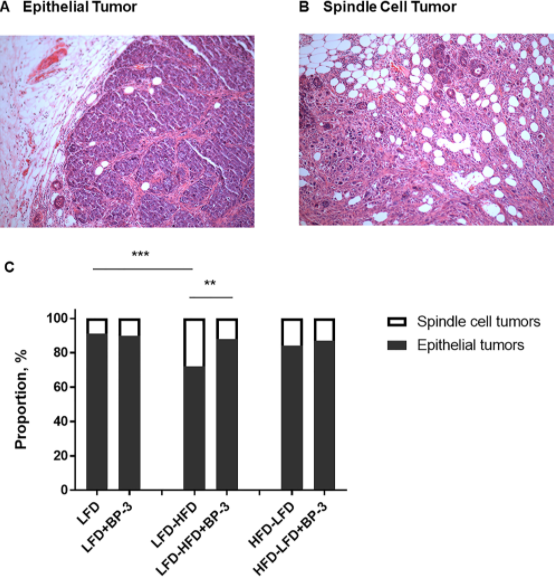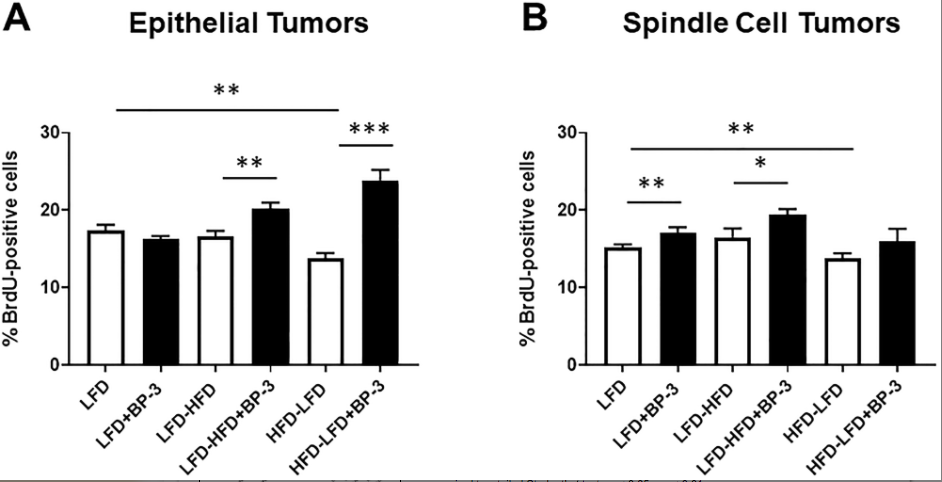Interview with Dr. Richard C. Schwartz from Michigan State University
Dr. Richard Schwartz from Michigan State University describes the research paper he co-authored that was published by Oncotarget on December 1, 2020, entitled, “Benzophenone-3 promotion of mammary tumorigenesis is diet-dependent.”
Behind the Study is a series of transcribed videos from researchers elaborating on their oncology-focused studies published by Oncotarget. Visit the Oncotarget YouTube channel for more insights from outstanding authors.
—
Dr. Richard Schwartz
Hello, I'm Richard Schwartz. I am a professor in the Department of Microbiology and Molecular Genetics at Michigan State University. And I recently published a paper entitled, "Benzophenone-3 promotion of mammary tumorigenesis is diet-dependent." This work, and the whole project associated with this, started a number of years ago with some studies on the impact of a diet high in saturated from red meat, something like lard, and it's effects on mammary tumorigenesis. And it was a fairly successful study showing the impact of high fat diet in promoting tumorigenesis and in showing that in fact there were both pubertal and adult windows of susceptibility to high fat.
At the instigation of National Institute of Environmental Health Sciences, we were prompted to extend our studies into chemical toxicants in the environment when the time came to extend the project, and my collaborators and I were thinking about critical toxicants in the environment that were understudied.
We centered on benzophenone-3, which is the major active ingredient in North American sunscreens. And there's existing literature on this chemical having either estrogenic or antiestrogenic effects in a variety of cell culture and in vitro systems. Thus, it seemed rather interesting in the context of mammary tumorigenesis, essentially anything that can mimic estrogen may have an impact. We thought it was a good target, led to funding, and we examined this chemical in the context of different diets, changing the exposure to a high fat diet from a high level to a low level, examining exposure during puberty and adulthood and, essentially, two-factor examination of tumorigenesis and looking at the interaction between benzophenone-3 and diet and either promoting or inhibiting the tumorigenic process. And the product of those studies to this point has been published in this paper, in Oncotarget.

It proved fruitful, the investigation. We found the biggest message we have is that benzophenone-3 is very biologically active in the system. It was actually, even though it's a sunscreen chemical, it was provided in the diets of the animal. But we dosed them at a level that produced excretion in their urine that would be similar to the amount of benzophenone-3 that you would find excreted in the urine of humans who had high levels of topical exposure to commercial sunscreen. So we think it has relevance to human exposures on that basis. What we found was that the exposure to BP-3, benzophenone-3, affected the course of tumorigenesis. In all of the diets that we investigated, whether a high fat diet was provided in puberty, in adulthood, or whether an animal was maintained on a low fat diet, but the specific effects that we saw in tumorigenesis varied with diet.
The effects were rather complex, but in balance, effects all seemed adverse. So on a low fat diet, for instance, we found that the presence of benzophenone-3 actually reduced the incidence of tumors. But a subclass of tumors that was less differentiated and more aggressive showing a morphology indicative epithelial to mesenchymal transition, the ability to metastasize presumably, even though we did not directly test metastasis. We found that tumors that had this kind of morphology, even though on a low fat condition, there were fewer tumors with BP-3, they were tumors that had a significantly higher rate of proliferation and a lower rate of apoptosis, which are both going to be adverse parameters in tumorigenesis. Those are properties that are going to be scored in when in you're scoring human tumors. What is the rate of proliferation? What is the rate of apoptosis in the tumor?
And seeing an increase in proliferation, decrease in apoptosis, is certainly adverse. So even though under those conditions, there were few tumors, the tumors looked more aggressive. When we looked at animals that had a high fat diet in adulthood, we actually saw an increase in the incidence of epithelial tumors. Tumors that still showed a lot of the differentiated properties of mammary epithelial cells and a morphology similar to mammary epithelial cells. But with BP-3, on the high fat diet, rather than seeing a reduction in the incidence of these tumors, they were increased and they were additionally more proliferative than they were in the absence of benzophenone-3. At the same time, we did see the similar reduction that we had seen in the low fat diet in the frequency of the spindle cell tumors, the more aggressive tumors. It's obviously a trade off and a complex one.
If you translate it to humans, would you trade off a higher incidence of epithelial tumors if you saw fewer really aggressive tumors? I can't really answer that question. But what I can say is that the indications of biological activity that changes tumor outcomes often, in an adverse fashion, suggests that we really need to dig deeper into the mechanisms that are altering tumorigenesis when the animal is exposed to benzophenone-3. There should be some caution in the use of sunscreens that would contain benzophenone-3. Where are we headed on this work? I mentioned that we saw an increased incidence of tumors when mice were exposed to benzophenone-3 while they were on a high fat diet in adulthood. And one of the things we noticed in those tumors, we saw that they were more highly vascularized. We also noted several gene expressions that are associated with angiogenesis and vascularization that had altered levels of expression in the presence of benzophenone-3.

So one future direction is examining how benzophenone-3 might alter the express of genes involved in the process of angiogenesis. The other thing that we noted in our studies that is certainly worthy of follow-up, and it relates to this converse result that we saw with the more aggressive tumors where they seem to be somewhat inhibited by the presence of benzophenone-3. What we see is that the epithelial tumors themselves have lower expression of genes that are associated with epithelial to mesenchymal transition, the advanced progression of the tumor to this more aggressive state. And that in fact is consistent with a more well vascularized tumor. Lack of vascularization and an anoxic state can often be a selection towards EMT, epithelial-mesenchymal transition, and progression of the tumor to a more aggressive state. So these are things we hope to investigate and look at the complexity of this mechanistically. Another take home message besides caution and using a chemical like this that's prevalent in sunscreens.
And I will say that exposure to this can be found in urine samples from 98% of the American population, but another thing that I point to here is that when we look at toxicants, the outcomes vary with diet. And I think it highlights the importance of testing the biological effects of toxicants across a range of dietary conditions. There's a tendency, I think, to set up experiments where we just look at the effects of toxicants on standard mouse chow, and we may miss effects in doing that. The interaction with diet is clearly encourages us to be looking at toxicants under a variety of dietary conditions before deciding its adverse effects or its benefits, if they're out there.
We hope to get more funding for another round of research, trying to get at the mechanisms that lay behind the effects of benzophenone-3 on tumorigenesis.
Click here to read the full study published by Oncotarget.
YOU MAY ALSO LIKE: More Oncotarget Videos on LabTube
—
Oncotarget is a unique platform designed to house scientific studies in a journal format that is available for anyone to read—without a paywall making access more difficult. This means information that has the potential to benefit our societies from the inside out can be shared with friends, neighbors, colleagues, and other researchers, far and wide.
For media inquiries, please contact media@impactjournals.com.

Copyright © 2025 Impact Journals, LLC
Impact Journals is a registered trademark of Impact Journals, LLC
